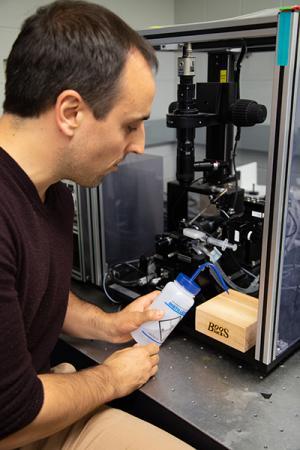
Credit: Meng Vang
University of Illinois Professor Nenad Miljkovic and his research group at Illinois have collaborated with John Boos & Co. to validate the antimicrobial efficacy of the company’s proprietary cutting boards and companion board oil and cream.
Miljkovic tested the antimicrobial characteristics of the Effingham, Illinois-based company’s USA-grown Northern Hard Rock Maple cutting boards, validating their ability to kill bacteria. Additionally, data gathered by his team concluded that application of the John Boos Mystery Oil and Boos Block® Board Cream on the boards created an antimicrobial, hydrophobic surface that decreased the surface bacteria to a clean level after three hours.
The study helped prove this particular cutting board is a safer, cleaner alternative to other boards currently on the market.
Miljkovic and his group in the Energy Transport Research Laboratory have extensive knowledge in the area of nanoengineered surfaces and coating technologies.
“We’ve been working on developing micro and nanostructured surfaces with antimicrobial function for the past four years as part of a separate collaboration with the U.S. Army Construction Engineering Research Laboratory (CERL) and the Department of Entomology at Illinois. Teaming up with John Boos & Co., a leader in the foodservice industry, opened up a new avenue of academic research that we had not considered before. Prior to this project, we believed the function of cutting board oil was simply to prevent drying of the wood, but our research showed that it actually enables microbes to absorb into the wood grain, which contain antimicrobial enzymes that kill bacteria. We found that Northern Hard Rock Maple was the most effective species of hardwood that contained these antimicrobial enzymes, which kill bacteria,” Miljkovic said.
The company’s proprietary oil and cream form two layers of protection on the board. First, they create a hydrophobic surface on which the bacterial moisture beads up, inhibiting adhesion of the bacteria to the board. The Mystery Oil enables any additional moisture to then be absorbed into the wood fibers, where naturally occurring enzymes kill any remaining bacteria.
Ted Gravenhorst Jr., John Boos & Co. Vice President of Sales and Marketing, was pleased to reconfirm the antimicrobial properties of their products. “Independent research has existed about the antimicrobial qualities of hardwood boards. However, the ‘new news’ from the University of Illinois lab confirms that the addition of Boos Block® Mystery Oil and Board Cream facilitates the process of killing bacteria, creating a clean surface for cooks to use over and over again.”
Since 1887, John Boos has manufactured butcher blocks from sustainable American hardwoods, which have no carbon footprint, for commercial and residential use.
###
Media Contact
Nenad Miljkovic
[email protected]
Original Source
https:/



